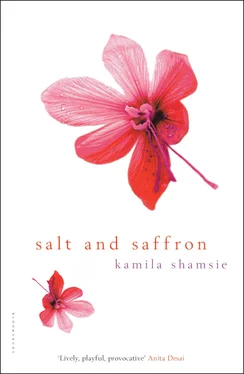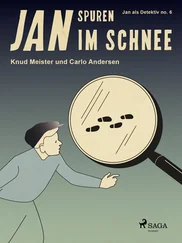
Conventional translations would render it something like this: ‘How long shall I write of my aching heart? Come! I will show my Beloved/My wounded fingers, my pen dripping blood.’ But my family always treats the ‘dard-e-dil’ near the beginning of the couplet as an invocation of our name, rather than allowing it to represent its literal meaning of ‘aching heart’. And so we read the line as: ‘How long shall I write of the Dard-e-Dils?’ And that undefined pronoun generally assumed to refer to the Beloved? We insist the pronoun stands for all of us who ever were and ever will be. No wonder we have such a skewed sense of things. By the age of three I imagined Ghalib — Ghalib! — showing me his blood-stained hands, implicitly beseeching me to allow him to stop.
There was more Ghalib to be found in the bookshelves that ran along the length of a wall. And not just Ghalib, but also Woolf, Faiz, Faulkner, Rumi, Hikmet, and a whole shelf devoted to Agatha Christie. Some thought it strange, but to me it made sense that such a worldless woman should surround herself with books. Celeste had once asked me, ‘Could she … did she write? To communicate with you?’ No, she did not. But, of course, she could have had she chosen to. The bedside-table drawer was filled with an eclectic mix of music, each tape labelled in her sloping hand. A portable stereo took up the lower ledge of the table.
Why was the stereo portable?
I opened my eyes. Mariam Apa’s room was no more. I stood in a drawing room, with plump divans ready to form a makeshift bed in the event of houseguests. Even the curtains had been replaced since my last trip home, the lemon-yellow of Mariam’s choice ripped down to make way for a geometric pattern of blue and white. Now, more than ever, only my ritual of memory preserved Mariam Apa’s room, awaited her return.
I walked across the marble floor, lay down on the divan, and looked out of the French doors leading to a terrace and to a garden beyond. Mariam and I shared this terrace, our adjacent rooms both leading out on to it. I sipped my tea and looked at my saucer. Cal’s hair was short at the back and the space between his hairline and his collar was the width of a hand. When we said goodbye I slid my hand around to the back of his neck, my fingers straying down to his spine.
Why was the stereo portable?
Four years ago Sameer had said, ‘Do you think they … you know? In your parents’ house?’
‘Don’t be a moron,’ I replied. ‘Of course not. Of course not.’
It’s true, my parents and I were light sleepers and, as the number of burglaries increased among people we knew, we’d become increasingly vigilant for late-night noises. So we’d have heard a squeak of door, a rustle of cloth, a tip of toe. But it’s also true that four years ago desire was an abstraction for me.
I rested my hand on the wall behind the divan. This used to be the wall behind Mariam Apa’s bed. It was also — though I hadn’t realized it until last year — a wall partially shared by Masood’s quarters. I knocked on the wall, put my ear against it. Solid. When my parents designed this house, almost fifteen years ago, they envisaged this as my room and, thinking ahead to my teenage years and the inevitable blare of music that would accompany them, they made certain the walls were soundproof. How I ended up in the room next door no one remembers.
I stepped out on to the terrace. Not long ago I’d woken up in the middle of the night at college, imagining Mariam Apa easing open the French doors, walking out into the garden in her nightdress, and turning the corner to Masood’s quarters. But there was a wall at that end of the garden, separating the grass from the concrete paving outside the kitchen and the servants’ quarters, and a large, spreading falsa tree grew in front of the wall. With such relief I had curled around my pillow, remembering that wall and remembering, in particular, the outdoor lizards — girgits — that skittered along the falsa tree, keeping away everyone in my family. I told Celeste about the dream, and when she said, ‘Oh, come on. A celibate love affair for possibly eighteen years?’ I stubbornly replied, ‘Pakistan isn’t as obvious as America. Our love stories are all about pining and separation and tiny gestures assuming grand significance.’ But Celeste rolled her eyes. ‘Hormones are hormones,’ she said.
Khaleel. Khaleel. Khaleel.
I traced his name on my wrist, in Urdu. Wrote the letters separately  and thought, Too curvy, then put them together
and thought, Too curvy, then put them together  and traced the word over and over. In the earliest days of Islam the drawing of portraits was forbidden. I’d always heard that ban was meant to discourage the semi-idolatry that might arise if people made pictoral depictions of Allah, or of the Prophet. But was it possible that the ban also recognized that words have a power that remains untapped? When artists turned from portraiture to calligraphy the dazzle of their art restored to words the power to make our eyes burn with tears and longing.
and traced the word over and over. In the earliest days of Islam the drawing of portraits was forbidden. I’d always heard that ban was meant to discourage the semi-idolatry that might arise if people made pictoral depictions of Allah, or of the Prophet. But was it possible that the ban also recognized that words have a power that remains untapped? When artists turned from portraiture to calligraphy the dazzle of their art restored to words the power to make our eyes burn with tears and longing.

The ringing phone startled me out of my reverie.
‘Awake?’ Aba said, when I finally found the phone, hidden behind a pile of books, and answered it. ‘A miracle!’
‘How’s the driveway?’
‘With my usual brilliance I’ve convinced the illustrious minister that the driveway should stay as is.’
‘How did you achieve that?’
‘Well, I told him that instead of doubling the length of the driveway he should double the intensity of the redness of the carpet.’
‘And this was seen as an acceptable solution?’
‘Why not? There’s no originality in a long driveway. But to have the reddest carpet in the country, that’s something. Only problem is, now your mother and I have to find the carpet.’
‘I sometimes forget how amusing you are.’
‘You sometimes forget a lot. Your dadi’s on her way to see you.’
‘Now?’
‘Now. I told her your mother and I were at home. I lied.’
‘Why?’
‘I love you. ‘Bye.’
I stood with the receiver beeping in my hand. Impossible now to skip over, avoid, forget, the first thought of the morning.
Dadi.
She’d always been strange about Mariam Apa.
At the time of my birth and Mariam’s arrival Dadi had been staying with my uncle in Paris. She had started that holiday tradition the summer after my grandfather, Akbar, had died much too young. His hair had begun to silver and his eyes no longer had their hawk-like vision, but Dadi’s sister, Meher, doesn’t mention that when she recounts her last glimpse of him, the evening before his stroke. Just arrived in Karachi from Greece, she had driven over to my grandparents’ house and pulled into their driveway in the failing light. Among a group of cricketers in the garden she saw a man silhouetted against the sun, bat in hand. The delivery was short of a length. The batsman danced out of his crease, went down on one knee, and swept the ball to the boundary with the grace of … ‘With the grace of the triplets in their youth,’ Meher Dadi said, the first time she mentioned it to me. ‘Taimur, Akbar, Sulaiman. He could have been any one of them, young and gorgeous with the world at his … at their feet. It was the first time in a long while that I’d thought of what he’d had to learn to live without. Aliya, I backed out and drove away. I didn’t want to wait for the light to change, didn’t want him to step forward and become the gruff man I’d known for so long that I’d forgotten that other Akbar.’ She closed her eyes and I knew she was imagining that other Akbar, and in her imaginings he stood with his brothers.
Читать дальше


 and thought, Too curvy, then put them together
and thought, Too curvy, then put them together  and traced the word over and over. In the earliest days of Islam the drawing of portraits was forbidden. I’d always heard that ban was meant to discourage the semi-idolatry that might arise if people made pictoral depictions of Allah, or of the Prophet. But was it possible that the ban also recognized that words have a power that remains untapped? When artists turned from portraiture to calligraphy the dazzle of their art restored to words the power to make our eyes burn with tears and longing.
and traced the word over and over. In the earliest days of Islam the drawing of portraits was forbidden. I’d always heard that ban was meant to discourage the semi-idolatry that might arise if people made pictoral depictions of Allah, or of the Prophet. But was it possible that the ban also recognized that words have a power that remains untapped? When artists turned from portraiture to calligraphy the dazzle of their art restored to words the power to make our eyes burn with tears and longing.











